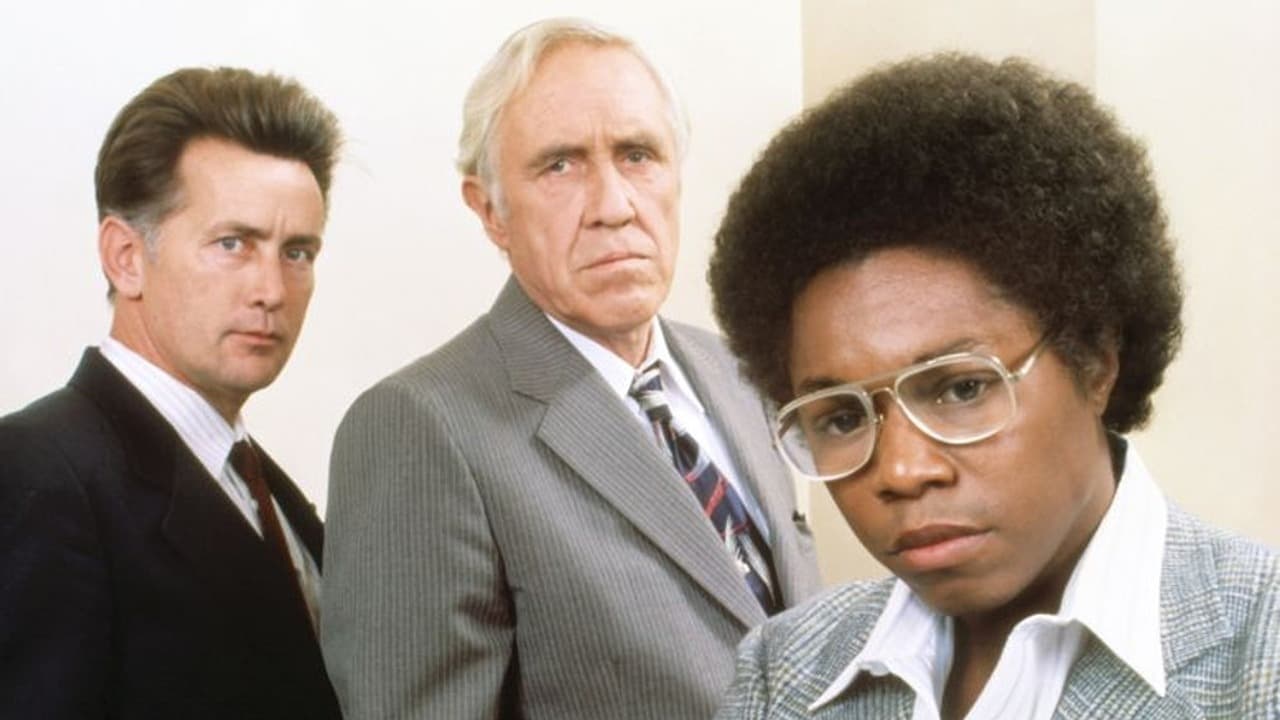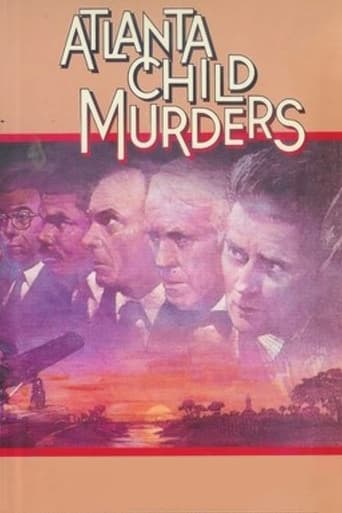

You won't be disappointed!
... View MoreThis Movie Can Only Be Described With One Word.
... View MoreAm I Missing Something?
... View MoreI gave this film a 9 out of 10, because it was exactly what I expected it to be.
... View MoreIn the 1980s black children began disappearing from the streets of Atlanta, Georgia, and it took the authorities quite a while to catch on. The press wasn't paying much attention because the murder of a visitor of high social standing was dominating the news. But because of the prodding by police detective Morgan Freeman and the pro bono investigations of a former detective Michael Sheen, the polaroid image of a serious serial killer slowly emerges from the emulsion. They got him, but not before many more victims.It would have been easy to turn this into a politically correct story of indifferent white mayors and cops versus innocent, quietly suffering black families. That's what I expected, since this was written by Abby Mann, who also wrote "Judgment at Nuremburg," in which every single German was guilty of being complicit in the Nazi genocidal program. There was simple good, and then there was simple evil. He accepted his Academy Award "in the name of all intellectuals everywhere." For whatever reason -- perhaps because Atlanta was run largely by African-Americans -- Mann provides a much more balanced film here. It's a surprisingly intelligent script. James Earl Jones, who in real life radiates good will, is the stubborn mayor who refuses to address the problem with all the city's resources. The police treat the early disappearances as examples of bad parenting in dysfunctional families, forcing the mothers to take lie detector tests and otherwise humiliating them.The antagonists themselves are now black "from top to bottom." Some of the white guys are actually on the side of the angels, while Atlanta's black community is quick to blame whites for trying to kill off blacks. The African-Americans are not only mistaken but their anger seems to be only a recent explosion of their underlying hatred of whites. "Hate is the only reality," shouts one protester, demonstrating the point. Acknowleding black racism in a made-for-TV movie is unusual enough to warrant the observation that we're all imperfect.Atlanta's black children are understandably terrified. They're just old enough to understand the threat. And their denials and fantasies are sadly uninformed. One boasts that the killer will never get him because he's watched so many Bruce Lee movies and has learned Dai Gwan Do.After a year and a half and a few dozen bodies, the bridges of Atlanta have been staked out by police. One cop hears a splash and alerts the others. The man driving slowly off the bridge is Wayne Williams, a presentable young black man who wears aviator glasses. He's a perfect target and the authorities are desperate, yet no one saw him stop his car, drag a bundle to the rail, and drop it into the Chatahootchie River, nor does an immediate search turn up a body. Williams is picked up and questioned by the police. He fails a polygraph test and his lawn and home become the center of a paroxysm of media attention. The press is savaged but Williams himself begins to do things that are weird. He calls a "press conference" in which he just hands out papers of his mostly faked resumé. He brags about having outwitted his police tail.When he's arrested, he's defended by Jason Robards, Jr.. The prosecution is led by the grim Rip Torn, aided by Andy Robinson, a human teratoma, the serial killer from "Dirty Harry." The movie clearly takes Williams' side. In a script by Abby Mann there must be outrage against injustice. There must be impassioned speeches. Any intellectual will tell you that.I won't go through the trial itself, which is presented in the usual Perry Mason fashion: the prosecution spends a moment presenting evidence; the defense by the unimpeachable Jason Robards, Jr., spends twice that time tearing it apart. It's easy to cast doubt on scientific evidence because science is based on probability, never certainty. That rules out "yes" and "no." If you ask a scientist to say he's absolutely certain of something, he must answer no. Will the sun rise tomorrow? The only correct answer is "probably." Then again every study has limitations. You say the DNA at the crime scene matches that of the suspect. Did you test the DNA of everyone on earth? No? Then you can't be sure, can you? Of course eyewitness testimony is more appealing but even more likely to be suspect, as social psychologists have repeatedly demonstrated.Morgan Freeman's juiced up detective is a triumph. He's an exceptional actor who has always elevated whatever film he's appeared in, through villainous and heroic roles. Sheen is casual and effective. Some of the supporting cast stand out as well, including Lynne Moody as a bereaved and angry single parent, while others out-herod Herod. CCH Pounder is memorable too. And Ruby Dee, my co-star, is always reliable. Ernest Harden Jr. as a street smart witness called "Cool Breeze" is side splitting.The media are shown as ruthless agents of tabloid journalism. That's okay, but Mann has the message spelled out by a shouting parent, while it's already been amply displayed on screen. The script doesn't always give the viewer much credit for sensitivity. The camera lingers on a hysterically sobbing mother. If anyone wants to see how such grief can be handled differently, watch Fritz Lang's "M", a German movie about a child murder, in which mothers grieve mostly offscreen. Lang figured that we already KNOW they're mourning.John Erman has exercised care in his direction. Excellent staging and camera placement, without directorial excess, except for one or two dysrhythmic shots. The editing is noticeably good too; some of the cuts come at precisely the right unexpected instant.
... View MoreExcellent, gripping Made-For-TV story of the abductions and murders of African-American children, adolescents, and adults in Atlanta in the early 80's, and the sensational trial of the one man brought to justice for these crimes. The murders and trial polarized the communities of Atlanta and its environs, and the TV Movie re-creates this stunningly well in its deliberately ambiguous portrayal of suspect Wayne Williams, the evidence against him, and the issues of presenting a capital case based almost solely on circumstantial evidence. Just as the case inspires controversy up to this day, so does this movie.Calvin Levels has Wayne Williams down pat in this production - alternately charming, charismatic, strange, and menacing - and creates a web of confused desires and motives that deliberately leaves audiences guessing - what REALLY happened on that bridge? Co-stars Morgan Freeman, Jason Robards, Rip Torn and Gloria Foster provide equally interesting performances throughout. While some viewers, especially those living in the Atlanta communities affected by these events, may be dismayed or even angered by the portrayal of the law-enforcement authorities attempting to make sense of this case, their issue is more with the deliberate manner in which no real sides are taken by the producers of this film. If in more recent decades the historic portrayal of White apathy towards crimes committed on Blacks is universally deemed insulting or unacceptable, then perhaps some progress has been made after all.
... View MoreWhen the "Atlanta Child Murders" first aired in the mid-'80s, it didn't raise too many eyebrows - even though Abby Mann's script intimates in the concluding minutes of the miniseries that convicted culprit Wayne Williams may NOT be the murderer of dozens of young men and boys in a horrifying crime spree that held Georgia's biggest city spellbound with fear three decades ago. Given Mann's film-making track record - "Judgment at Nuremberg," "King," etc. - nobody was going to accuse him of being a conservative. In fact, most of his work has always seemed philosophically bound by a boilerplate leftism and a near-obsession with black/white race relations in America. It wasn't too much of a surprise that he would spring his unique - and frankly bizarre - theory on network television. For Mann, Williams was the victim of incompetent police work, corrupt city government and that old devil, racism. OK. Sure.But now, it's 20 years later. Wayne Williams is still in prison. While the serial killings of Atlanta's young have not continued (in fact, they stopped with Williams' arrest in 1981), Williams still maintains his innocence. So, where's Abby? Shouldn't he be working for William's freedom? Or, if he's changed his mind, repudiating his own theory? I mean: We're stuck with a 1985-vintage "J'accuse" that seems to have been conveniently forgotten by its own creator. Where's Abby? Is he sitting up in Beverly Hills with the rest of the Hollywood Chardonnay proletariat, reading the Daily Worker and ordering the Third World servants around?If Wayne Williams is innocent, shouldn't SOMEONE be trying to free this poor victim-of-the-system from prison? And if, indeed, he's guilty, why did Abby Mann ever say he was innocent? Real mystery, huh?
... View MoreRobards and Torn are the best part of this long crime drama that you must struggle to stay with. The plot gets confusing and the already mentioned stars give the film its only stand out performances
... View More